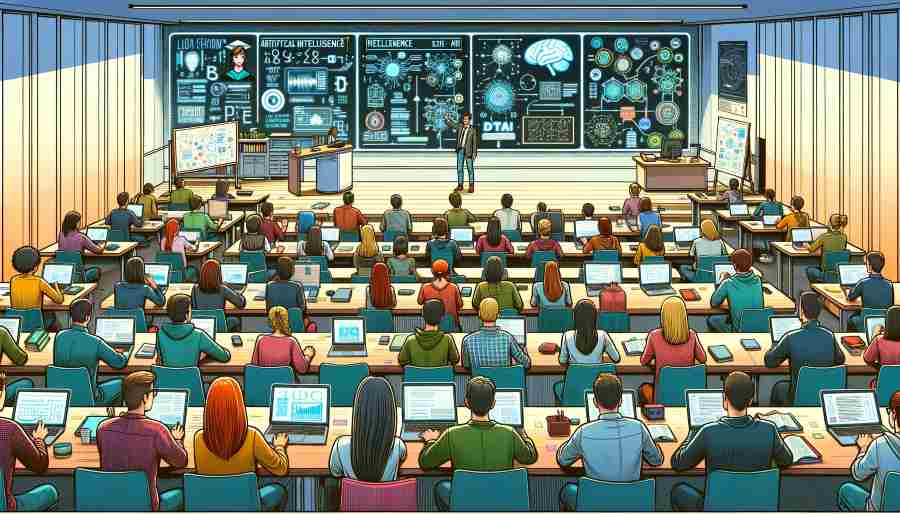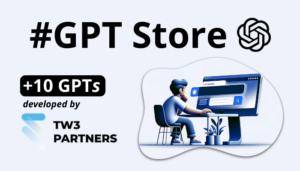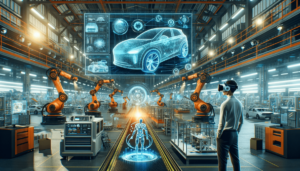The Integration of AI in Higher Education: A Global Overview, Challenges, and the Impact of a Transformative Technology on Education Systems
The integration of Artificial Intelligence (AI) in higher education is poised to significantly impact both academic and administrative domains. AI brings new promises such as automated student assessments, predictions of academic success, ‘smart’ tutoring systems, personalized assistance, responsive learning management, and heightened responsiveness to labor market needs. AI can significantly improve student onboarding and optimize their educational journey. In teaching, AI may lead educators towards greater impact and economic efficiency. However, successful integration depends on addressing challenges related to education quality, employment impacts, biases (gender, ethnicity, age), privacy, and security. It is useful to examine strategies for AI integration in different parts of the world, including Asia, the United States, and Europe.
AI Integration in Higher Education: What are the Global Trends?
A recent publication (2023), “Artificial Intelligence in Higher Education: The State of the Field,” based on an analysis of AI & higher education publications, reveals a significant shift in research from the United States to the Far East (China, Taiwan, Japan, Korea). This shift signals a new global dynamic in educational technology. China and Taiwan dominate in AI research and implementation, demonstrating East Asia’s commitment to redefining education through cutting-edge technologies. Despite a decrease in research volume, the United States maintains strong influence in academic applications of AI and remains a pioneer in AI research within higher education. Leading universities use AI to enhance learning experiences and optimize administrative functions. American academic societies, like the American Chemical Society, are particularly attentive to AI integration in curricula, adopting an empirical approach based on field feedback.
Discover the potential of generative AI to optimize your processes, create new growth levers, and secure your digital transition.
TW3 Partners supports you with strategic solutions tailored to your business.
Your digital transformation starts here
The European Union distinguishes itself from other continents through its focus on AI’s ethical aspects (reliable AI, AI Act) and frugal character. It actively develops legislative frameworks for responsible AI implementation, contributing positively to education while respecting societal values and norms. In France, AI applications in education are receiving governmental attention, aiming to promote it as a tool for remediation or enhancement in French and mathematics through Interactive Learning Modules.
The Role of AI in Education
AI facilitates a shift from traditional teaching methods to more interactive, student-centered approaches. It enables dynamic learning environments where students receive real-time feedback and personalized instruction. Advanced AI analyses and machine learning algorithms can tailor educational content to individual student needs, offering a more engaging and effective learning experience. AI will also play a significant role in curriculum development, helping educators create relevant, up-to-date content. Job market intelligence will benefit greatly from AI tools, positively impacting the creation of continuously updated educational content.
Which AI?
Global attention to AI spiked in November 2022 with the emergence of the generative AI ChatGPT 3.5, which astonished even domain specialists with its capabilities. Its latest version, ChatGPT 4, is multimodal, capable of automatically processing entire files and images, and even browsing the web. Given its capabilities, the impact of a generative AI like ChatGPT in education will be profound, but it also poses specific challenges (plagiarism, errors, data privacy) not presented by ’embedded’ AIs like the French Ministry of Education’s interactive learning modules. Indeed, ChatGPT operates beyond the control of educational institutions. In some disciplines, there are rumors that ChatGPT 4 could pass exams with good grades… Universities are rightly concerned about such tools and are reflecting on their impact on standard student assessment processes. They are seeking solutions to avoid plagiarism and cheating. For instance, the Faculty of Economics in Prague has announced that undergraduate students will no longer have to write theses, as entire paragraphs can now be written by ChatGPT, achieving excellent grades. In the physical sciences, ChatGPT 3.5 falls short of writing a first-year chemistry lab report (ChatGPT 4 has not been tested yet), as reported in an article in Chemical Education. However, the authors highlight that this generative AI produces quality introductions and can significantly aid in structuring the report, improving language quality and expression, which can be beneficial for those lacking sufficient writing skills.
Leverage our expertise to integrate artificial intelligence strategically—without compromising security or business consistency.
TW3 Partners supports you with a personalized and efficient approach.
Bring Your Business into the Generative AI Era
Like in many other fields, the use of generative AIs poses significant issues of data privacy and usage. Solutions developed by OpenAI and its competitors may be far more effective than those envisaged by universities for internal development (’embedded’ AIs) but with much fewer resources. Educators wishing to implement AI solutions might turn to these powerful providers through ad hoc solutions that query their AIs via APIs (currently, GPT-4 Turbo 128 k is the most used). However, data protection and intellectual property must be safeguarded. In the near future, smaller open-source AIs, fine-tuned for specific uses like education, could compete with Open AI products while complying with European regulations. The EU should therefore support its own AI champions in these areas.
Preparing Students for an AI-Driven Job Market
It is evident that AI will greatly impact work methods as a productivity accelerator. Preparing students to use AI effectively is crucial. Higher education institutions must ensure students possess the necessary AI skills (AI literacy) to navigate a rapidly evolving employment landscape.
Training Educators for an AI-Led Future
Equipping educators to use AI tools effectively is essential for successful AI integration in education. Professional development programs and workshops can provide educators with the skills and knowledge to utilize AI in enhancing teaching and learning.
Challenges of Integrating AI
Integrating AI into higher education presents several challenges, including issues related to education quality, staff training, job displacement, biases, and data security. Employers’ recognition of AI competencies is also a critical factor.
Download our white paper to learn how to integrate generative AI efficiently, sustainably, and responsibly into your business.
Case studies, adoption strategies, orchestration, SEO, HR, marketing…
A concise collection of insights and practical advice to help you take action.
Generative AI: From Experimentation to Real Transformation
Conclusion
In East Asia and the United States, AI integration in higher education is well underway, leading to significant innovations in learning capacity enhancement, personalized learning, supposed to increase student engagement. However, its advanced integration in higher education requires careful consideration of ethical, social, and economic impacts. The EU is particularly attentive to these issues, rightly moving towards a regulatory policy. The emergence of generative AI like ChatGPT, particularly in its latest version, raises burning questions, challenging traditional student evaluation methods. The higher education world is beginning to understand its potential use, dangers, and benefits. The question of including AI in learning methods is becoming central, as students and teachers must quickly adapt to these tools through dedicated training. Additionally, it will be necessary to determine if locally produced solutions can be implemented by educational institutions or if they will need to resort to more powerful solutions from major AI players, albeit with serious data protection and intellectual property issues. Thus, there is hope that Europe will support its own AI champions, offering AI-boosted educational tools that adhere to protective regulations.
François Rochet
Professor at Sorbonne University, Paris, France




